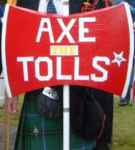
HOME England Figures London M6 Toll NEWS Road Pricing Scotland Wales
Edinburgh Congestion charge Manchester Congestion charge Runcorn toll bridges aka Mersey Gateway

HOME
England
Figures
London
M6 Toll
NEWS
Road Pricing
Scotland
Wales
Edinburgh Congestion charge Manchester Congestion charge Runcorn toll bridges aka Mersey Gateway
CONTACTS |
Please contact us if you can help with the fight against a particular toll; or if you believe anything on this site is inaccurate or misleading, or have any suggestions, questions or comments. Email: England Scotland Wales and Severn Phone (for media and other enquiries): 0774 269 5699 |
HOME England Figures London M6 Toll NEWS Road Pricing Scotland Wales & Severn